
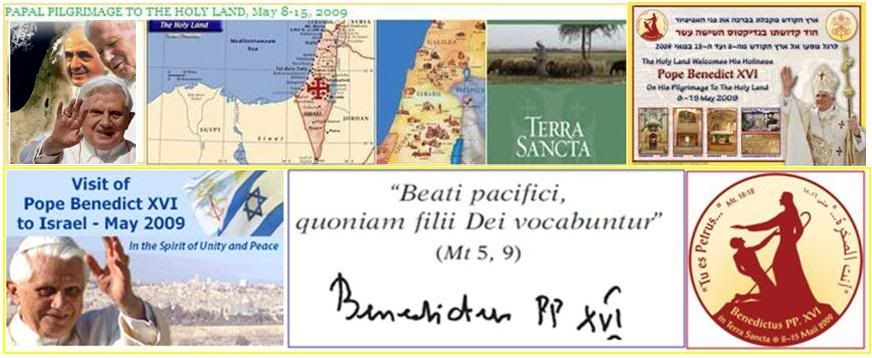 DEPARTURE
DEPARTURE
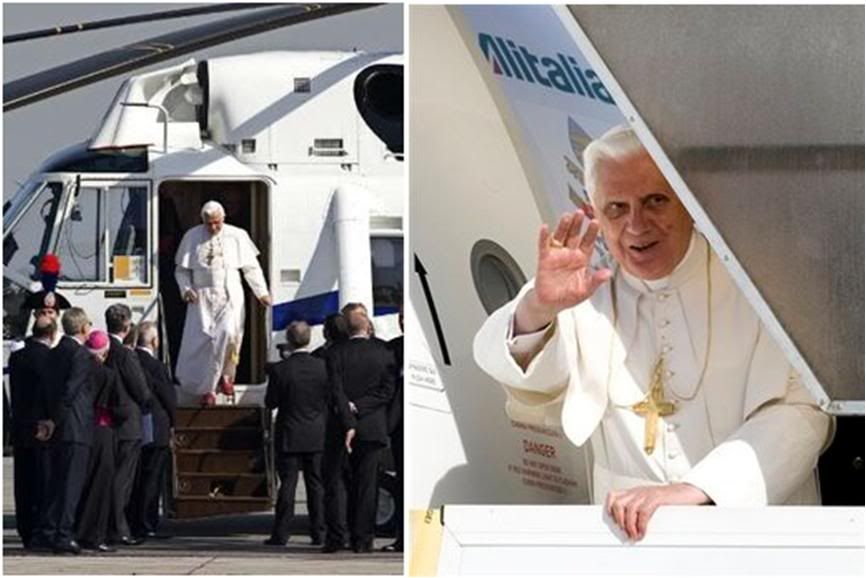
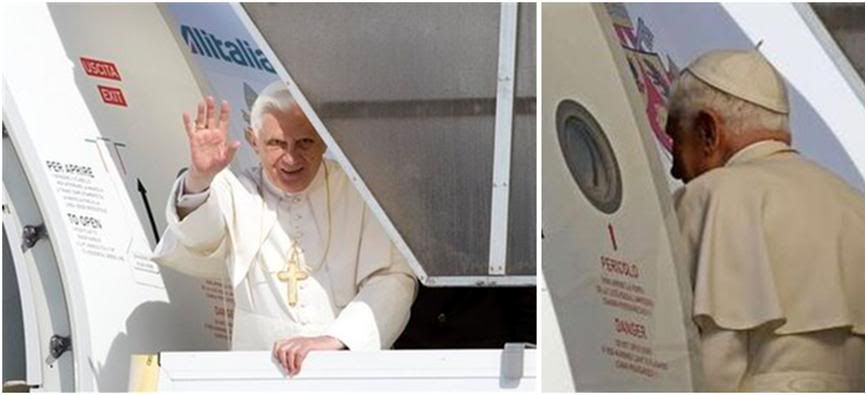
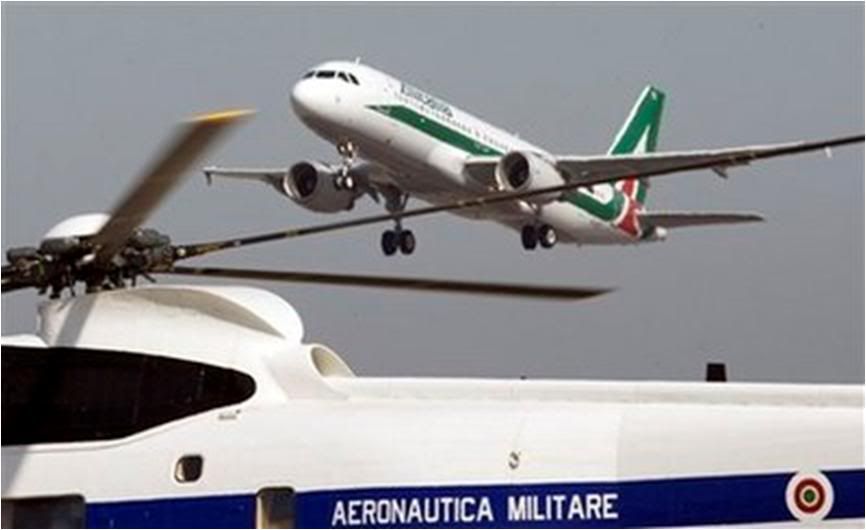 Pope heads to Mideast
Pope heads to Mideast
on 'pilgrimage of peace'

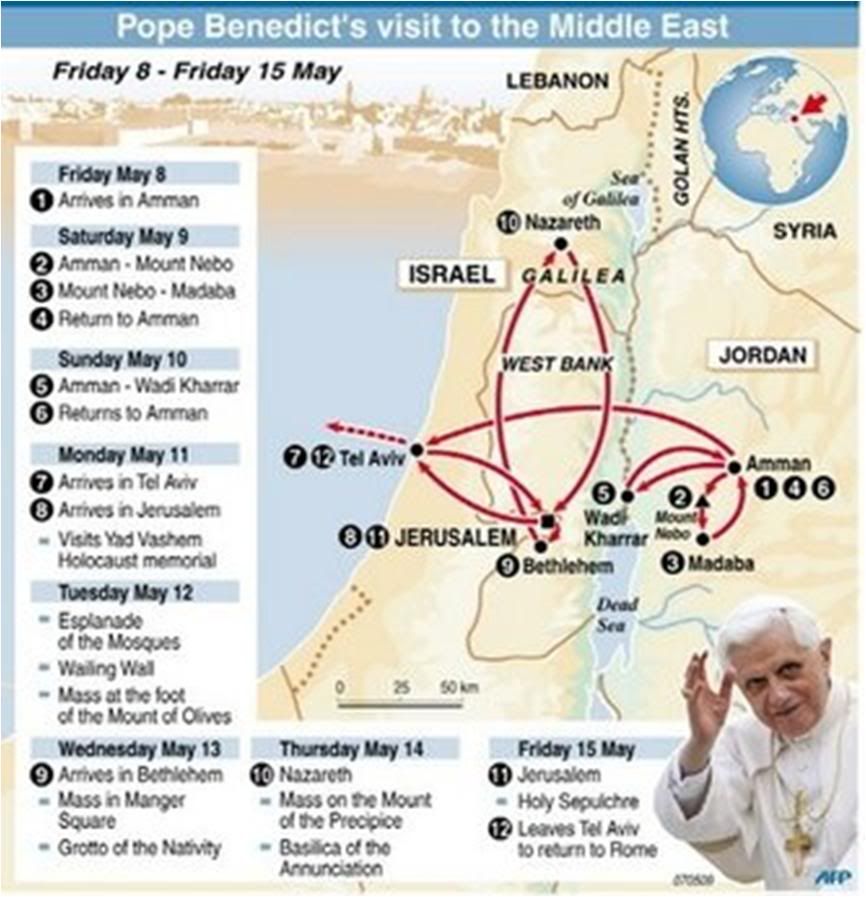
AMMAN, Jordan, May 8 (AP) – Pope Benedict XVI on Friday headed for Jordan, where he will begin his first Middle East visit as a self-proclaimed pilgrim of peace but could face criticism from Muslims still upset over past comments he made about the Prophet Muhammad.
Jordan's powerful Muslim Brotherhood has demanded Benedict apologize ahead of his visit for his September 2006 speech in which he quoted a Medieval text that characterized some of Muhammad's teachings as "evil and inhuman," particularly "his command to spread by the sword the faith."
The pope has already said he was "deeply sorry" over the reaction to his speech and that the passage he quoted did not reflect his own opinion. But he has not issued a public apology as demanded by the Brotherhood, setting the stage for potential conflict with Jordan's largest opposition group when he arrives in Amman on Friday.
Vatican spokesman Federico Lombardi said the Vatican has made all possible clarifications, telling Associated Press Television News that "we cannot continue until the end of the world to repeat the same clarifications."
The Pope set off for Jordan from Rome on Friday and is also scheduled to visit Israel and the Palestinian territories during his weeklong Middle East tour. Benedict's three-day stay in Jordan is his first visit to an Arab country as pope.
During his time in Jordan, Benedict is scheduled to meet with Muslim religious leaders at Amman's largest mosque — his second visit to a Muslim place of worship since becoming pope in 2005. He prayed in Istanbul's famed Blue Mosque, a gesture that helped calm the outcry over his remarks.
He is also expected to meet with King Abdullah and Queen Rania, as well as Iraqi Christians driven from their homeland by violence.
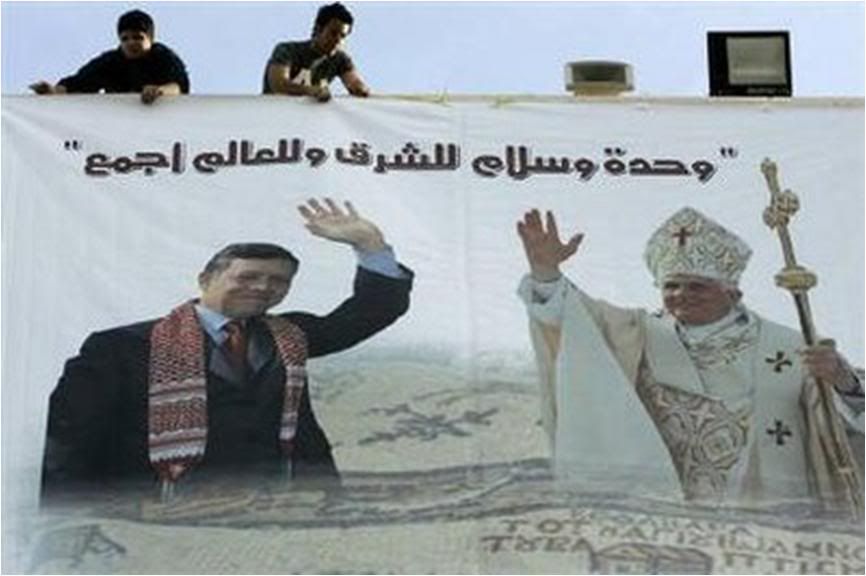 Other preparatory Anglophone reports are pessimistic as usual, almost offensively so, picking out and stressing only the negative - spushing their agenda of a Pope who has alienated everybody. I pray they will all eat their words soon.
Other preparatory Anglophone reports are pessimistic as usual, almost offensively so, picking out and stressing only the negative - spushing their agenda of a Pope who has alienated everybody. I pray they will all eat their words soon.
NONE OF THE FOLLOWING STORIES EVEN MENTIONS THAT THIS IS A PILGRIMAGE.
But where are the usual wire services this morning? The first three items posted in Yahoo's list are all 'irregulars' on the Pope beat. AP's was posted half an hour ago, and I used it above, because it is the least negative so far, even if it's a virtual repeat of a story filed yesterdya or two days ago.
![[SM=g1782473]](https://im1.freeforumzone.it/up/17/73/324410086.gif)
![[SM=g1782473]](https://im1.freeforumzone.it/up/17/73/324410086.gif)
![[SM=g1782473]](https://im1.freeforumzone.it/up/17/73/324410086.gif)
![[SM=g1782473]](https://im1.freeforumzone.it/up/17/73/324410086.gif)
![[SM=g1782473]](https://im1.freeforumzone.it/up/17/73/324410086.gif)
![[SM=g1782473]](https://im1.freeforumzone.it/up/17/73/324410086.gif)
![[SM=g1782473]](https://im1.freeforumzone.it/up/17/73/324410086.gif)
![[SM=g1782473]](https://im1.freeforumzone.it/up/17/73/324410086.gif)
![[SM=g1782473]](https://im1.freeforumzone.it/up/17/73/324410086.gif)
![[SM=g1782473]](https://im1.freeforumzone.it/up/17/73/324410086.gif)
![[SM=g1782473]](https://im1.freeforumzone.it/up/17/73/324410086.gif)
![[SM=g1782473]](https://im1.freeforumzone.it/up/17/73/324410086.gif) Tepid reception expected
Tepid reception expected
for Pope Benedict in Israel
By Cliff Churgin and Dion Nissenbaum
McClatchy Newspapers
JERUSALEM, May 7 — When Pope Benedict XVI arrives in the Middle East this weekend for his first visit as head of the Roman Catholic church, he will be met by crowds, signs and banners — and not all of them will be welcoming.
Muslim activists have hoisted a critical banner in Nazareth warning of "humiliating punishment" for anyone who insults the Prophet Mohammed, recalling the Pope's stark criticism of Islam three years ago.
A dwindling Palestinian Christian population in Bethlehem wants Benedict to use Israel's towering concrete separation wall as a backdrop for an appearance at which they want him to challenge Israeli policies they see as hurdles to peace.
And wary Jewish leaders will be watching the German-born pope, whose bungled embrace of an excommunicated, Holocaust-denying bishop resurrected a longstanding dispute over the Vatican's role during World War II.
Benedict's eight-day visit, which begins with a stop Friday in Amman, Jordan , will serve as one of the biggest tests of his ability as pope to deal with 2,000 years of volatile, divisive and often-deadly religious relations.
"We have created among us, all three sons of Abraham, a ferocious enemy," said Oded Ben-Hur , a former Israeli ambassador to the Vatican . "The name of this enemy is an abyss of ignorance. We don't know each other, and this is the mother of all problems."
One of the first issues Benedict will face when he arrives in Israel Monday will be a display at Israel's Yad Vashem Holocaust museum that the Vatican has gone to great lengths to make sure the pope will not see.
The display, featuring a photo of Pope Pius XII, says the Nazi-era pope "did not protest" the Holocaust, "even when reports about the murder of Jews reached the Vatican ."
Under a photo of Pius is a poem: "While the ovens were fed day-and-night, the most Holy Father did not leave his palace, with crucifix high to witness one day of pogrom."
The display is an unresolved source of tension between Israel and the Vatican , which established full diplomatic relations in 1994.
Benedict, whose cardinals are still weighing whether to declare Pius XII a saint, has said that the wartime pope "spared no effort" to help Jews escape Hitler.
At one point last year, a Vatican cardinal said that Benedict wouldn't visit Israel until the language about Pius was changed.
Benedict will pay his respects to Holocaust victims at the Yad Vashem memorial. He will not, however, visit the museum — a decision also taken by his predecessor, Pope John Paul II .
Benedict three months ago lifted the excommunication of a clergyman, Richard Williamson , who'd denied the worst horrors of the Holocaust. Benedict initially resisted calls to rescind the decision, even though Williamson refused to recant his views.
After weathering the storm, Benedict last month conceded that he'd made mistakes in handling the case and should've known about Williamson's statements.
Skepticism of Benedict's Holocaust views is also colored by the pope's own personal history: As a teenage boy in Nazi Germany , Benedict was compelled to become a member of the Nazi Youth at age 14 in 1941 and was drafted by Hilter's army two years later.
Whereas the Polish-born John Paul was seen as a pioneer in religious reconciliation, Benedict is seen as having created more religious friction.
A year after becoming pope, Benedict alienated many Muslims with a 2006 speech in which he quoted a Byzantine emperor who said the prophet Mohammed had brought nothing but evil to the world.
Benedict later said he was "deeply sorry" and distanced himself from the emperor's views. For some Muslims, however, it wasn't enough.
Zahi Nujeidat, a spokesman for the Islamic Movement , said the group will boycott Benedict's visit. At the same time, they urged him to visit the Hamas -controlled Gaza Strip , which has barely recovered from Israel's recent military offensive.
"For someone who is so sensitive to the Holocaust, what is happening in Gaza is no less than a holocaust — it is the genocide of the 21st century and he should acknowledge it with a visit of an hour or hour and a half," Nujeidat said.
Benedict won't visit Gaza , which one of his cardinals called a "big concentration camp" during the recent military operation, infuriating Israeli leaders. Instead, Benedict will travel to Bethlehem , where Palestinian leaders have built a stage below a snaking section of Israel's concrete separation wall running alongside Aida Refugee Camp.
Palestinian leaders are hoping that Benedict will use the platform to issue a strong defense of Palestinian rights. Israel, however, has demanded that Palestinian construction workers stop building the stage, which it considers a security threat.
![[SM=g1782473]](https://im1.freeforumzone.it/up/17/73/324410086.gif)
![[SM=g1782473]](https://im1.freeforumzone.it/up/17/73/324410086.gif)
![[SM=g1782473]](https://im1.freeforumzone.it/up/17/73/324410086.gif)
![[SM=g1782473]](https://im1.freeforumzone.it/up/17/73/324410086.gif)
![[SM=g1782473]](https://im1.freeforumzone.it/up/17/73/324410086.gif)
![[SM=g1782473]](https://im1.freeforumzone.it/up/17/73/324410086.gif)
![[SM=g1782473]](https://im1.freeforumzone.it/up/17/73/324410086.gif)
![[SM=g1782473]](https://im1.freeforumzone.it/up/17/73/324410086.gif)
![[SM=g1782473]](https://im1.freeforumzone.it/up/17/73/324410086.gif)
![[SM=g1782473]](https://im1.freeforumzone.it/up/17/73/324410086.gif)
![[SM=g1782473]](https://im1.freeforumzone.it/up/17/73/324410086.gif)
![[SM=g1782473]](https://im1.freeforumzone.it/up/17/73/324410086.gif) Controversy precedes Pope
Controversy precedes Pope
on trip to Middle East
by Lourdes Garcia-Navarro
National Public Radio

NP
R is notoriously ultra-liberal althoughit is public radio in the United Sattes, i.e., publicly funded.
May 8, 2009 · Pope Benedict XVI begins his first tour of the Holy Land this week, with stops in Jordan, Israel and the Palestinian territories. It's only the second official papal visit to the Jewish state and the occupied territories, coming nine years after a groundbreaking trip there by Pope John Paul II.
The Vatican says that Pope Benedict will bring a message of peace to the troubled region, but his visit is still stirring controversy among both Israelis and Palestinians.
Israelis Hope For Clarification
One place Pope Benedict will visit is Yad Vashem, Israel's official memorial to the Holocaust, where he will deliver a speech. Many Israelis say that what he says will be pivotal to how he is perceived in the country.
The Pontiff — a German who was briefly a member of the Nazi youth movement — most recently raised the ire of Jews when he rescinded the excommunication of a Holocaust-denying Catholic priest.
Avner Shalev, who heads Yad Vashem, says many Israelis want to hear the Pope firmly acknowledge what happened to the Jewish people.
"He should be more sensitive. He should be more careful about how he relates to the events of the Holocaust," Shalev says. "To me, his position is not clear enough — and to many, many others. So it gives him a great opportunity to clarify it for his believers, his followers and many, many other human beings."
But whatever the Pope says, the church and the directors of the Holocaust memorial site will still be at odds.
The Pope's speech will be made on the grounds of Yad Vashem, but he will not visit the adjoining museum — in protest of an exhibit that alleges that then-Pope Pius XII did nothing to stop the extermination of the Jews.
Pope Benedict has vigorously defended his predecessor's wartime record and supports his canonization.
Another stop on the papal itinerary is Bethlehem, which has a sizable, but dwindling, Christian community.
The barrier that Israel is building in and around the West Bank has made life more difficult for Bethlehem's residents.
The Rev. Marwan Didas, a Palestinian priest who lives in Bethlehem, says every year, more Christian families are leaving the area looking for opportunities elsewhere. He says he hopes the pope's visit will give Christians an appreciation of their own land and a reason to stay.
Palestinians Seek Spotlight For Their Plight
After addressing his Christian flock, the Pope will visit the mostly Muslim residents of Aida, a nearby refugee camp. There, next to the partition that divides the Palestinian territories and Israel, camp residents are building an amphitheater, which the Israelis have threatened to demolish.
Jumah al-Owais is helping to build the theater. He says the idea was to have the huge concrete slabs of the wall serve as a backdrop for a speech the Pope was scheduled to deliver.
"When the Pope comes, the eyes of the world will follow him, and so all the world will see the suffering of the Palestinian people," Owais says.
But Mustafa Jamil, of the refugee camp's council, says that the stage has become too controversial and the Pope will instead make his address from a nearby school.
Jamil says he is bitterly disappointed that the Vatican caved to what he terms "Israeli pressure."
"We were very excited about the visit of the Pope. We prepared this place to receive him, then we were shocked to find out that the Pope will not be delivering his speech in the place we had prepared but somewhere else," Jamil says.
Although the stage won't be used for the papal visit now, the Palestinians are still busy building it — and the Israelis continue to threaten to demolish it.
This one is a very obnoxious, nastly loaded item from the ultra-liberal LA Times, which only reports negative statements. Why are they even covering the event????
![[SM=g1782473]](https://im1.freeforumzone.it/up/17/73/324410086.gif)
![[SM=g1782473]](https://im1.freeforumzone.it/up/17/73/324410086.gif)
![[SM=g1782473]](https://im1.freeforumzone.it/up/17/73/324410086.gif)
![[SM=g1782473]](https://im1.freeforumzone.it/up/17/73/324410086.gif)
![[SM=g1782473]](https://im1.freeforumzone.it/up/17/73/324410086.gif)
![[SM=g1782473]](https://im1.freeforumzone.it/up/17/73/324410086.gif)
![[SM=g1782473]](https://im1.freeforumzone.it/up/17/73/324410086.gif)
![[SM=g1782473]](https://im1.freeforumzone.it/up/17/73/324410086.gif)
![[SM=g1782473]](https://im1.freeforumzone.it/up/17/73/324410086.gif)
![[SM=g1782473]](https://im1.freeforumzone.it/up/17/73/324410086.gif)
![[SM=g1782473]](https://im1.freeforumzone.it/up/17/73/324410086.gif)
![[SM=g1782473]](https://im1.freeforumzone.it/up/17/73/324410086.gif) Jordan first stop
Jordan first stop
on Pope's Holy Land visit
By Jeffrey Fleishman

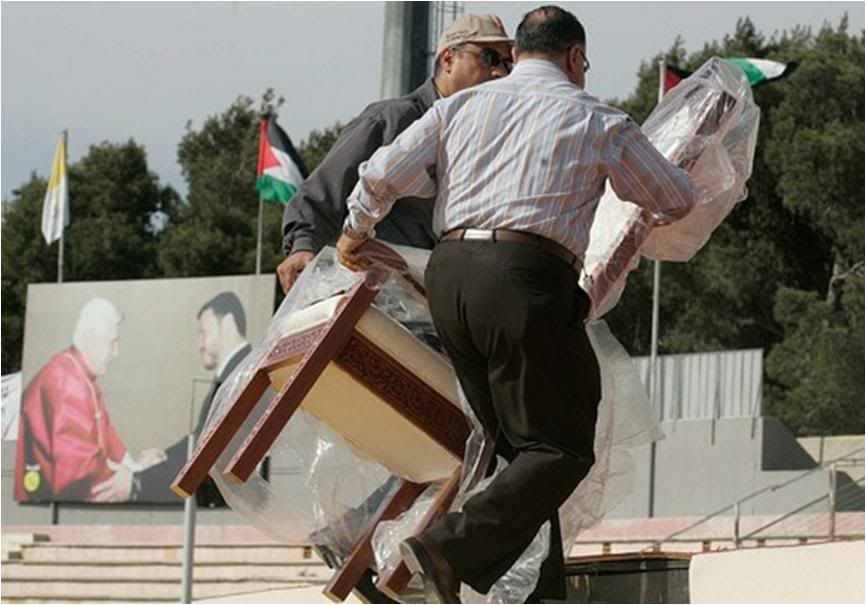
Reporting from Amman, Jordan -- Pope Benedict XVI arrives in Jordan today on a three-day pilgrimage to bless a tiny Catholic population and improve the Vatican's relations with a Muslim world greeting him with aloofness, anger and a slight hope that he may advance peace in the Palestinian-Israeli conflict.
On his first visit to an Arab country, the 82-year-old pontiff is receiving little fanfare. Benedict outraged Muslims in 2006 when he quoted a medieval emperor's condemnation of Islam as a violent religion. He later said he regretted the pain his comments evoked and has since stressed interfaith dialogue and reconciliation between Catholics and Muslims.
The pope, whose sermons and speeches will be scrutinized across this tribal kingdom, departs Monday on the next leg of his Holy Land visit, which will take him to Israel and the West Bank.
Jordan is a moderate Islamic country with a British-educated monarch and a fashion-plate queen. The pope's intent is to build religious detente here that will bring Muslims and Christians together to help counter the world's moral and social ills.
But the Pope is uneasy over a general lack of religious freedom in Arab countries
[Isn't Jordan an exception in this respect?], and many Muslims view the Roman Catholic Church as another Western institution insensitive to how Islam has been stereotyped and vilified since Sept. 11, 2001.
"When you are responsible for 1 billion Catholics and you're speaking to 1 billion Muslims, you should be mature and discreet," Yasser Abu Hilaleh, a Jordan-based writer and commentator, said of the pontiff's 2006 speech. "This is a time of chaos and terrorism, and such comments provoke hostility. They take us backward. They give credence to extremism. Al Qaeda celebrated the Pope's statements."
By balancing Jordan, Israel and Palestinian territory in his pilgrimage, the pope is venturing onto incendiary religious and political terrain. Each side will parse and analyze what he does and says at each stop. He's expected to visit the Al Hussein bin Talal Mosque in Amman, the Jordanian capital, and the Western Wall in Jerusalem.
Will he sympathize with Palestinians in the Gaza Strip? Will he counter accusations that the Vatican was complicit in the Holocaust? Will he mention the two-state solution for a Palestinian homeland when he speaks in the West Bank?
It is a careful dance of adjectives, inflection and nuance. And it rests on the shoulders of a religiously conservative pope with a professorial demeanor who lacks the charisma of his predecessor, John Paul II.
Benedict has been praised for his intellect, but
his ideology [It's called Catholic doctrine, Sir!] and occasionally acerbic statements mixed with cool detachment have infuriated many Jews, Muslims and Christians.
Such passions arise easily in Amman, a city of white hewn-stone buildings and hotels that ripple over hills at the edge of Roman ruins. But Zaki Bani Arshid, whom one might expect to be rallying street protests against the Pope, sits in his office at the Islamic Action Front with other things on his mind. He has said publicly that the Pope is not welcome in Jordan until he apologizes. He's leaving it at that.
"There's apathy around this visit. Jordanians don't care," he said. "We have economic concerns, the incompetence and weakness of this country to stop corruption -- even the swine flu is preoccupying people more than the pope's visit. He will not be accepted in this part of the world. . . . And I don't expect him to offer any gesture toward reconciliation. He insulted Islam and now he's going to Israel after the Israeli war on Gaza and the rise of the conservative Likud government."
Edward Eid is a Catholic and general director of Greek Orthodox schools in Jordan. Such a role might seem contradictory for him, but in Jordan, where Christians account for less than 4% of a population of about 6 million, interdenominational mingling is a way of life. Eid has a VIP ticket to the Pope's Sunday Mass, but he's not going, feeling a closer allegiance to his Muslim countrymen than to the Holy See.
"We Christians paid the price for what the Pope said in 2006," he said.
"Before he says anything about the Middle East, he should know how Christians live here."
The Christian population has been shrinking through economic emigration and over the rise of Islamic conservatism. For every church that is built, one mosque, or possibly two, pops up in the same neighborhood.
After the Pope's comments three years ago, he said, 15 Muslim families threatened to remove their children from Eid's schools; rancor and bruised feelings spread between the Christian village where he grew up and the neighboring Muslim town. Tribes, customs and family connections fixed things, but there remains an air of unease.
"The Pope's a smart fellow and I was astonished. His comments were like a bullet out of a gun. You can't take them back. Even the Orthodox Church told me, 'Leave us out of the Pope's visit,' " Eid said. "But I'm using the visit for the benefit of Jordan. The pope travels with something like 2,000 journalists. Jordan will be shown all over the world."
A dust storm had passed and dusk was glowing over the desert when Sheik Ramadan al Sheik, the imam at the Kalouhy Mosque, opened his door in the minutes before evening prayers. Two children played nearby and sung verses from the Koran lilted on a radio in the distance. A heavyset man with a light beard, Ramadan said he was unaware the Pope was coming.
"The Pope? Was he here recently?" the imam in the white tunic said after opening the mosque door.
"He's coming."
"I did not know."
"Islam," he then said, "is a forgiving religion, so we welcome him despite his comments. But something that touches my religion, my prophet -- of course I was upset. I think the pope should apologize."
He doesn't know if that will happen when Benedict visits the reputed burial place of the biblical Moses and the spot along the Jordan River where Christians believe Jesus was baptized by John the Baptist. The imam spoke of Islam being caricatured in the West and then, as often happens in this region, talk turned to the Palestinians.
"The Pope should express his conscience. He's a religious man," Ramadan said. "He knows what Israel has done, killing innocents in Gaza. The pope's word is heard. He represents Christianity. His voice is more effective than President Obama's because I believe people are more religious than they are political."
The loudspeaker in the minaret scratched with the prayer caller's voice. Ramadan stood and excused himself, quieting the children and heading toward evening ablution.
Special correspondent Ranya Kadri contributed to this report.
[Modificato da TERESA BENEDETTA 09/05/2009 00:33]